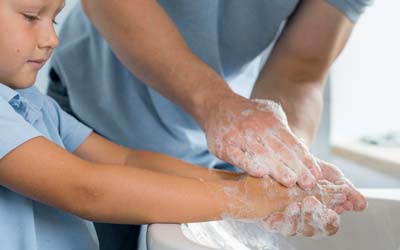Common Skincare Problems in Children – What Parents Need to Know
Children have more delicate and sensitive skin than adults. As parents, it is important to know how to care for your children’s skin, so that their skin will be healthy as they age.
General Skincare Tips for Everyone
Limit time spent in direct sunlight
Sun exposure can cause sunburn, skin ageing or even skin cancer. Avoid the mid-day sun between 10am to 4pm when the sun’s rays are the strongest and most harmful. When possible, wear cool, comfortable clothing that covers the body, such as lightweight cotton pants, long-sleeved shirts and wide-brim hats.

Always wear sunscreen
Apply sunscreen on exposed skin any time your child is outdoors – even on cloudy days as most of the sun’s UV rays can still get through the clouds. Look for a “broad-spectrum” sunscreen, which will screen out both UVA and UVB rays. Use a water-resistant sunscreen with a sun protection factor (SPF) of at least 30. Apply it 15 to 30 minutes before going outdoors, and make sure you reapply it every two hours, or after swimming or sweating.
For babies younger than six months, use sunscreen with at least SPF 15 on small areas of the body, such as the face, if protective clothing and shade are not available. Sunscreens containing titanium dioxide and zinc oxide are preferred for infants and children with sensitive skin, as they cause less skin irritation.

Protect the hands
Living in the current COVID-19 pandemic, hand hygiene is particularly important. However, repeated washing of hands throughout the day, whether with soap and water or alcohol-based hand sanitisers, can result in dry and cracked skin. This can lead to irritant contact dermatitis, where the skin is itchy, red or burning. This can be reduced by moisturising the hands frequently, washing with lukewarm water instead of hot water, and using alcohol-based cleansers when the hands are not visibly dirty.
Keep the face clean
With the current need to wear face masks for prolonged periods of time, this can also cause skin irritation. To reduce this, wash the face with warm water and use a gentle non-soap facial skin cleanser once or twice a day. Apply mild, fragrance-free moisturisers to the face before and after wearing a mask, and apply lip balm to the lips. It will also help to use layered masks made from soft, breathable fabric, like cotton.
Minimise scars
As children become more mobile, they may be more prone to cuts and wounds. To minimise scars, keep the wound moist while it heals – you can put a thin layer of petroleum jelly on it. Cover it with a bandage or gauze, and keep it clean and dry. After the wound has healed, apply sunscreen to it to help reduce red or brown discolouration and help the scar fade faster.
“Remember, it is never too early to teach your children about skin protection and start them on good habits to have a lifetime of healthy, beautiful skin. If your child has a persistent rash, or if you suspect it may be due to an infection or allergy, do consult a doctor.”
Common Skin Conditions in Babies and Children
Despite our best care, skin conditions do affect infants and children. Common ones include:
Diaper rash
This is usually caused by contact with skin irritants, such as urine and faeces. Rarely, reactions to fragrances and preservatives in moist baby wipes may occur. Frequent nappy changes and gentle cleansing with warm water can help prevent it. The use of hypoallergenic baby wipes is recommended. Thick zinc oxide and petrolatum barrier creams can also help prevent irritation. Occasionally, yeast infection may complicate the picture, requiring the use of antifungal creams. A yeast diaper rash is usually worse in the groin folds.
Eczema (atopic dermatitis)
This is common in infancy and early childhood. It causes an itchy, red rash, and the skin is often dry and thickened. Areas most commonly affected include the joints, face and neck. Although there is no cure for eczema, fortunately about half of children grow out of it by adulthood. To help with eczema, moisturise frequently with unscented thick creams and ointments. Also, avoid skin irritants, such as harsh soaps, being too hot or sweating too much, sudden temperature changes, wool or synthetic fibers (eg. polyester). In addition, your paediatrician may prescribe steroid creams or ointments to help with itching and swelling.
(Source: Raffles Health)










